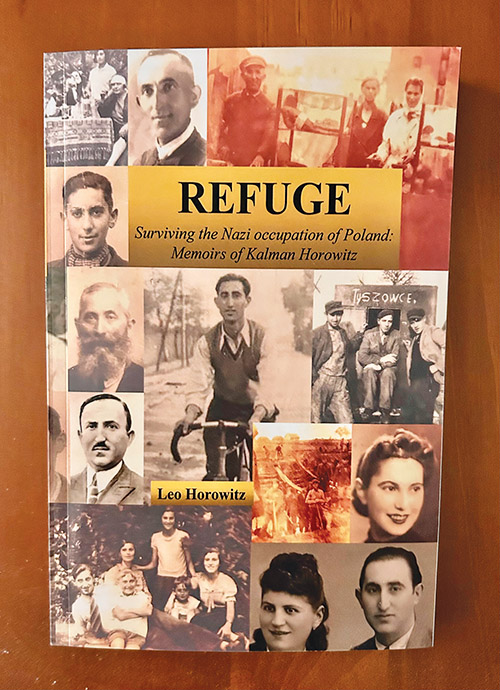
Highlighting: “Refuge: Surviving the Nazi Occupation of Poland: Memoirs of Kalman Horowitz,” by Dr. Leo Horowitz. CreateSpace Independent Publishing Platform. 2015. English. Paperback. 274 pages. ISBN-13: 978-1512384307.
If each of us is obligated to do our part to preserve the memory of those lost in the Shoah, Leo Horowitz was surely already yotzei (had fulfilled his obligation).
Horowitz and his family live in Highland Park and are members of Congregation Etz Chaim. A now-retired physicist who previously worked at Honeywell, BAE and Erco, Horowitz wrote and published “Refuge: Surviving the Nazi Occupation of Poland: Memoirs of Kalman Horowitz,” an account of his father’s harrowing struggles to evade capture and survive in Poland during World War II.
The memoir of survival, build on extensive interviews with his father, includes detailed recollections of specific episodes in his long struggle to survive, a poem he wrote to describe the work details, a wealth of period photos, and a recreation of one of the barns the older Horowitz hid in to escape capture. The 273-page book, published in 2006, is available on Amazon.
For most of us, publishing that book would be more than sufficient cause to recite “Dayenu” and move on to other pursuits. Yet after a few years, Horowitz found himself ensconced in another Holocaust book project connected to the town in Poland where his father had lived, Otwock.
Horowitz recalled first spotting a slim book in Yiddish, titled “Churban” and published in 1948 by Otwock survivor Binyamin Ornstein, on his parents’ bookshelves in their home in Queens. Many years later, he spotted the same volume at the Yiddish Book Center in Amherst, Massachusetts, and realized that he owned it as well, in the collection of books he had inherited from his parents. Looking at the book in his home, by now in poor condition, he realized that, as an out-of-print Yiddish book, it was largely inaccessible to the public. He decided to translate the book into English, while also scanning and reprinting the original text in Yiddish. He includes both in the same volume.
Horowitz was motivated in part by the fact that “Churban” offers glimpses of his father’s life in the prewar and early war years. In two of the book’s photos, Horowitz added arrows to point out his dad in group scenes. The book was the first publication to feature the poem Kalman Horowitz wrote to describe the cruel work details imposed by the Germans on groups of Jewish men confined in work camps. The long poem offers a vivid sense of the fear, horror and cruelty of the experiences of the work inmates. Its first verses speak out:

Tra-ta-ta-ta, tra-ta-ta
Don’t ask, don’t talk, keep quiet, shhh!
500 Jews crammed together
From various towns selected.
To work, to work, for whom, for what?
For tyrants, murderers, for oppressors, to what end?
Roll call! Stand in line by threes,
Listen to the tumult and wild screams
The book features a vivid description of Jewish community life and the local economy of prewar Otwock and two neighboring towns, Falenic and Karczew. It also includes the suspenseful story of how Ornstein survived the war years by taking big risks to escape his work camp, travel undetected in occupied Poland, and adapt quickly as one temporary refuge proved too hazardous.
In the acknowledgements in the translated section of “Churban,” Horowitz credits his wife Dina for her “assiduous efforts” to proofread the volume and his daughter Keren Amy with careful scanning and reproduction of the pages of the original publication.
Asked by The Jewish Link what motivated him to pursue this second book project, which took months to complete, he said that he felt compelled “to save the book” and “get it out there,” as it is another moving story of survival during the Holocaust.
To secure a copy of the newly translated version of “Churban,” go to Amazon.com.
Harry Glazer is the Middlesex community editor for The Jewish Link. He can be reached at [email protected]









